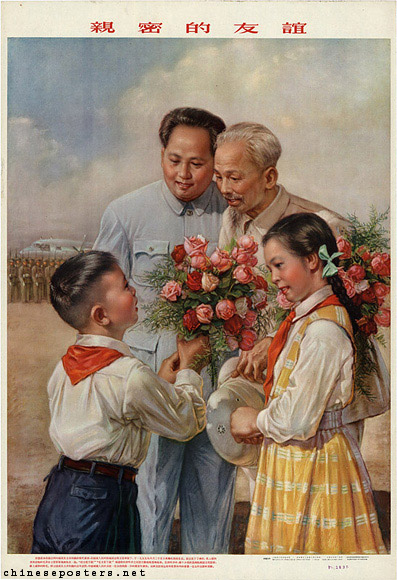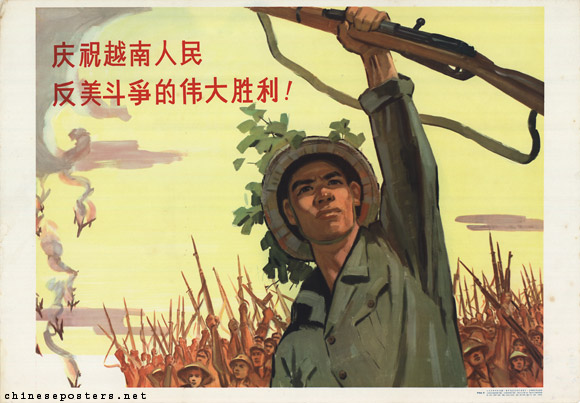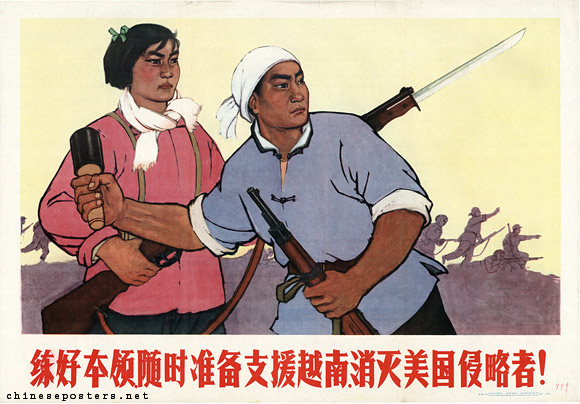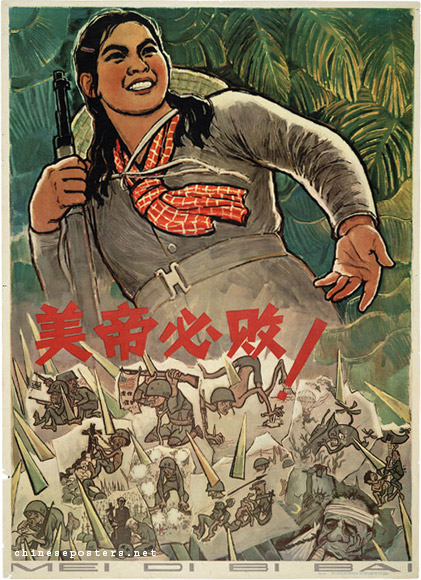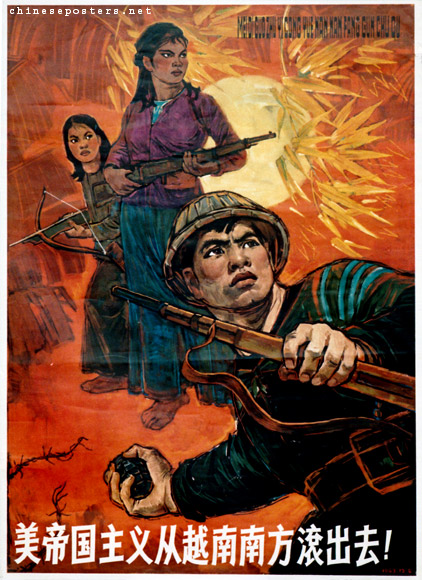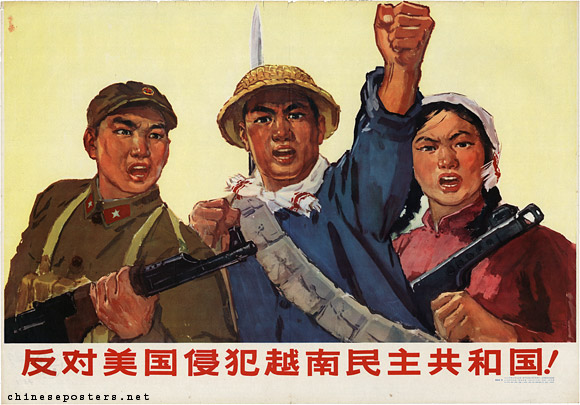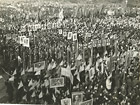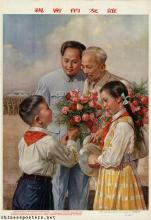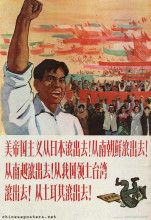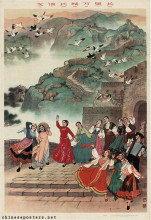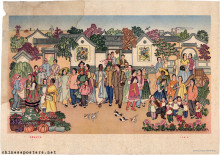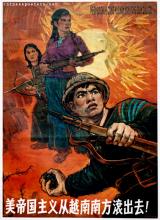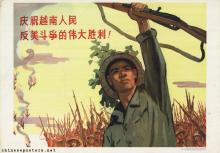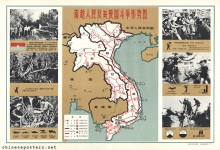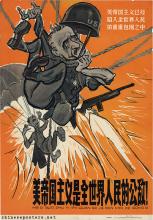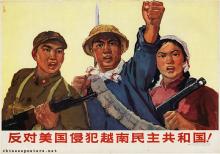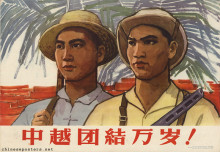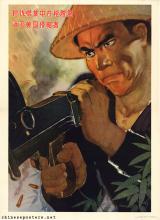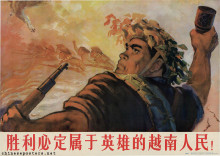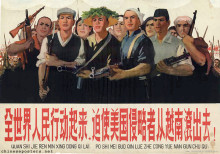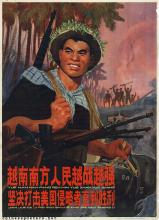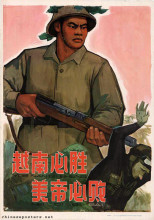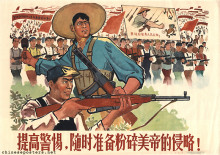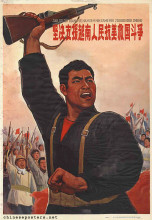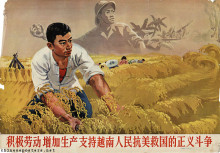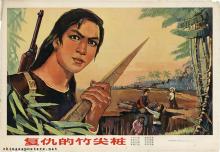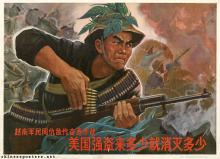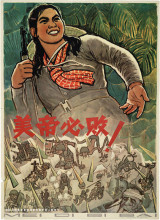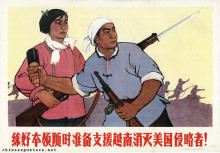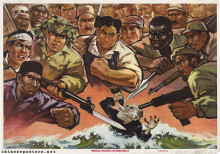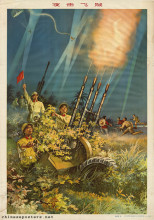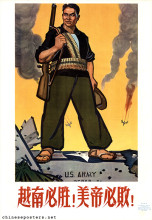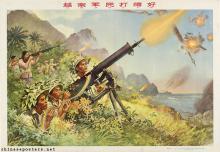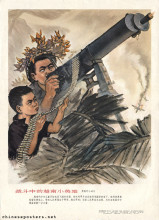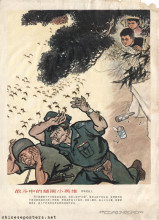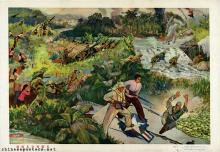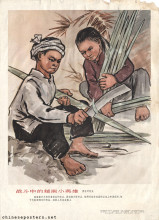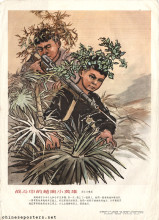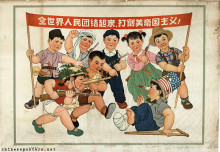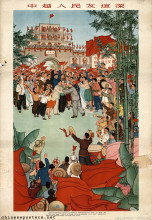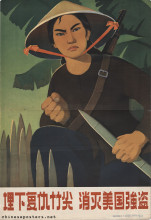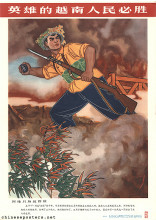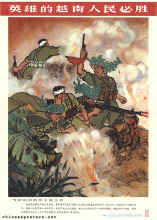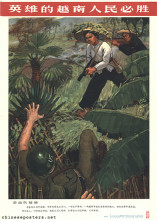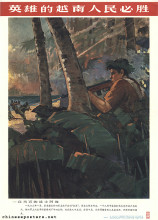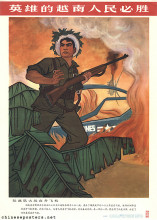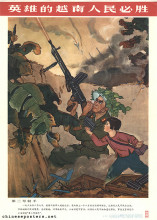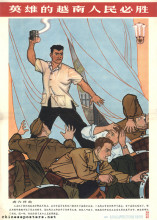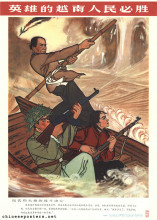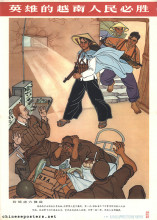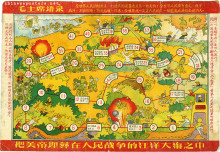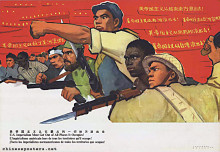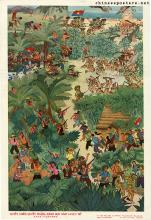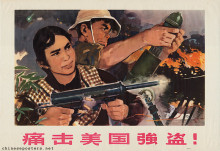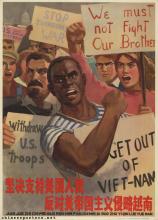Since the early 1940's, the Vietnamese communists had followed the line of the CCP. Already in 1954, Hanoi and Beijing agreed to build up strategic communication networks including railroads, highways, marine and air transportation and telecommunications. However, the Democratic Republic of Vietnam was unwilling to conclude a military alliance with the PRC. After the Great Leap Forward, Vietnam declared its ideological independence from China and sided with the USSR. The Vietnamese came to view Mao Zedong's doctrine of peasant revolution as a departure from genuine Marxist-Leninism. The ideological gap was widened by the outbreak of the Cultural Revolution.
Celebrate the great victory of the Vietnamese people in their struggle against America!, 1965
During the Vietnam War, the Chinese watched the American military activities south of its borders with considerable trepidation. A potential spillover of hostilities onto Chinese territory seemed both possible and imminent, all the more so as China had taken the side of North Vietnam. China's hand had been forced in this respect by the fact that the Soviet Union had invoked the principle of international proletarian solidarity, and Beijing felt it could not stay behind.
Practice skills, be always prepared, support Vietnam, wipe out the American aggressor!, 1966
The Navy supported the North Vietnamese troops, and deployed a number of advisers and some troops against the American forces in Southeast Asia. The struggle of the North Vietnamese against the Americans inspired many Chinese poster artists in the late 1960s, early 1970s, although it is difficult to say whether their works of art ever strongly influenced popular political consciousness.
American imperialism must be defeated, 1965
Ironically, China at the time was actively engaged on the diplomatic front trying to broker an agreement between the Vietnamese and the Americans while negotiating reconciliation with the US. When the Army decided in 1974 to 'liberate' the Paracel (Xisha) Islands in the South China Sea that were occupied by South Vietnamese forces, however, propaganda posters most certainly succeeded in boosting feelings of patriotism.
American imperialism must be driven out of Southern Vietnam!, 1963
Once Vietnam was united under the Hanoi government in the mid-1970s, and the new leadership spent more energy in pursuing good relations with the Soviet Union than maintaining its ties with Beijing, the Chinese friendship evaporated. The former staunch ally and comrade-in-arms had turned into an enemy. This became even clearer when Vietnam turned against Chinese allies such as the Cambodians. But the Chinese indignation about the treatment of their Indochinese allies by Vietnam after the defeat of the US was never turned into a propaganda campaign. As a result, it never merited the publication of posters.
Oppose the American infringement upon the Vietnamese Democratic Republic!, 1965
Surprisingly, when the PRC embarked on a punitive expedition against Vietnam in 1979, the so-called "Self-Defensive Counterattack against Vietnam", no propaganda poster materials were released to drum up popular support for this initiative, nor were the Vietnamese, or their activities elsewhere in Indo-China, criticized. The same applies to the recurring border clashes that took place during most of the 1980s.
Here are some propaganda photographs from 1976, featuring the use of propaganda posters, wallposters and big-character posters in a "Rally against U.S aggression in Vietnam", Beijing, February 1965.
The people of Vietnam will triumph! The U.S. aggressors will be defeated! (Beijing: Foreign Languages Press, 1966)
Joshua Eisenman, "China’s Vietnam War Revisited: A Domestic Politics Perspective", Journal of Contemporary China 28:119 (2019), 729-745
Xiaorong Han, "Sino-Vietnamese Border War (1979)", in Xiaobing Li (ed), China at War -- An Encyclopedia (Santa Barbara: ABC-CLIO, 2012), 411-413
Jessica Harrison-Hall, Vietnam Behind the Lines - Images from the War 1965-1975 (London: The British Museum Press, 2002)
Li Danhui, "China-U.S. Détente and China’s Aid to Vietnam to Resist U.S. Intervention - The Vietnam Factor in China’s Foreign Policy Readjustment", Social Sciences in China 24:2 (2003), 165-176
Qiang Zhai, "Beijing and the Vietnam Conflict, 1964-1965: New Chinese Evidence", Cold War International History Project Electronic Bulletins, Winter 1995/1996
Qu Xing, "Chinese and Vietnamese Views on the Indo-China War: Strategic Unity and Tactical Differences", Social Sciences in China 24:2 (2003), 134-135
Xiaoming Zhang, "China’s 1979 War with Vietnam: A Reassessment", The China Quarterly No. 184 (2005), 851-874
